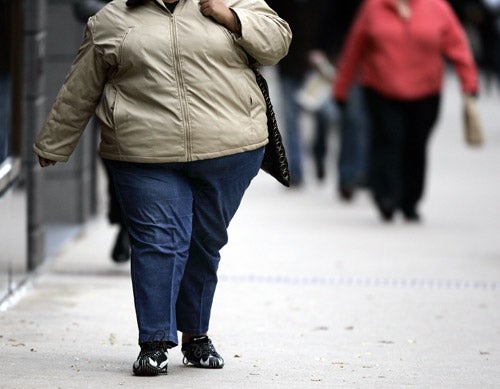Obese people will be paid to lose weight

Your support helps us to tell the story
From reproductive rights to climate change to Big Tech, The Independent is on the ground when the story is developing. Whether it's investigating the financials of Elon Musk's pro-Trump PAC or producing our latest documentary, 'The A Word', which shines a light on the American women fighting for reproductive rights, we know how important it is to parse out the facts from the messaging.
At such a critical moment in US history, we need reporters on the ground. Your donation allows us to keep sending journalists to speak to both sides of the story.
The Independent is trusted by Americans across the entire political spectrum. And unlike many other quality news outlets, we choose not to lock Americans out of our reporting and analysis with paywalls. We believe quality journalism should be available to everyone, paid for by those who can afford it.
Your support makes all the difference.Overweight people are to be paid to shed the pounds under a £372m incentive scheme aimed at making Britain the first country in the world to reverse rising obesity levels.
The initiatives, which have been successfully used in the US, will be tried out in a few areas at first.
They are part of a national strategy launched yesterday intended to signal a new determination by the Government to tackle the "obesity epidemic".
Proposals include the introduction of a single food labelling system, measures to boost walking and cycling and extra controls on junk food advertising to children.
Restrictions on the contents of school lunch boxes, and technical innovations to enable parents to limit children's TV and internet use are under discussion.
In the US, obese adults offered $14 (£7) for every 1 per cent reduction in their body weight were five times more likely to meet the 5 per cent target weight loss over three months than those who received nothing.
The results of the study carried out at the University of North Carolina were published in the Journal of Occupational and Environmental Medicine last year.
Almost a quarter of men and women in England are now obese and the proportion is forecast to grow to 60 per cent by 2050 if nothing is done.
The government-commissioned Foresight report on obesity, published last year, said the rise would impose an unsustainable burden on the NHS and cost society about £50bn.
Gordon Brown said in a foreword to the report that obesity was "one of the biggest threats to our health". But the target to halt the rise in child obesity by 2010, set in 2004, has been put back by a decade. The new target is to reduce the level of child obesity back to its 2000 level by 2020. Consumer groups and opposition parties criticised the strategy yesterday for lacking bite.
The Liberal Democrats dismissed it as a "series of vague aspirations and gimmicks, with few concrete proposals". The Conservatives accused the Secretary of State for Health, Alan Johnson, of "dithering" over food labelling. Sue Davies, from the consumer organisation Which?, said: "Given the stark warning delivered by the Foresight report, this strategy shows a shocking lack of urgency from the Government. It is largely a rehash of several proposals which were on the table three years ago that have not been pushed through."
Mr Johnson defended the report, claiming it provided the "first joined up strategy in the world" and contained "meaty proposals". They included a £75m marketing campaign to promote healthier lifestyles and £30m to design healthier towns which promote walking and cycling.
On food labelling, an area of dispute between the food industry and its critics, Mr Johnson pledged to impose a single labelling system as a last resort if the industry could not agree one.
The Food Standards Agency backs a traffic-light system with unhealthy foods labelled red and healthy foods green.
But most supermarkets have opted for a more complex system listing guideline daily amounts (GDAs) on packets.
The Secretary of State for Education, Ed Balls, said he would be writing to head teachers urging them to introduce a packed lunch policy. More than half of children take packed lunches to school and there are concerns about their contents.
"It doesn't make sense to have tough rules on the nutritional standards of meals and then turn a blind eye to packed lunches," he said.
Successful initiatives
Peterborough
Offering relevant travel advice to households increased walking and cycling by more than 20 per cent and reduced car use by 13 per cent.
Saint Jean, France
One of 100 French towns to have joined Epode, a scheme aimed at preventing obesity among children. It reduced the proportion who were overweight from 19 per cent in 2004 to 13.5 per cent just a year later.
Durham
In the 12 months following introduction of road charging, 10 per cent more people made their journey on foot.
Central London
Better cycle networks led to a 30 per cent rise in cycling over three years.
Join our commenting forum
Join thought-provoking conversations, follow other Independent readers and see their replies
Comments